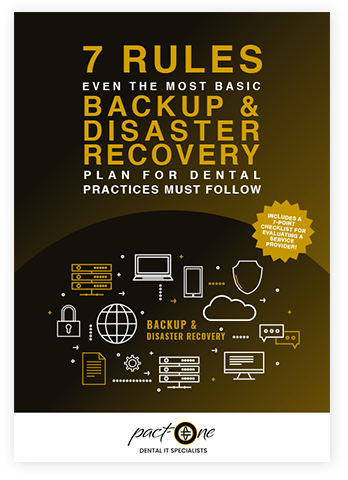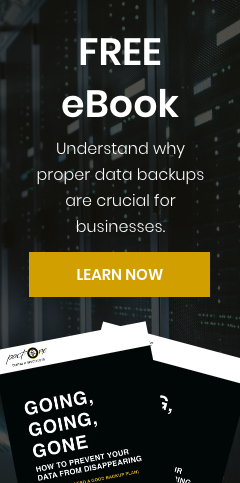Did you know that dental healthcare providers are vulnerable to disruption and downtime? Dental offices house a huge amount of sensitive data such as patient files, bank account information, and credit card numbers, all of which can be lost during a cyberattack or a natural disaster. This is why your dental office needs to have an effective disaster recovery plan in place.
Disaster recovery and backups
There's a common misconception that data backup and disaster recovery are the same. They're closely linked, but they're actually distinct from one another. Data backup is the process of saving data in a secure location so that it can be restored in case it is lost or compromised.
Disaster recovery, on the other hand, is a bigger process designed to replicate your organization's entire computing environment in a secondary location. This secondary environment allows you to access data as well as restore functionality when your primary environment is compromised by a natural disaster, cyberattack, or human error. It is a part of an organization's business continuity plan and focuses mainly on the IT systems that support important business functions. You can have backups without a disaster recovery plan, but you can't have a disaster recovery plan without having data backups.
Downtimes come with a high cost
Unplanned downtime caused by cybercriminals or natural disasters can severely cripple your business. Even just an hour of downtime can cause organizations without disaster recovery plans to suffer huge operational and economic losses. In fact, there have been many instances of companies going out of business within five years of suffering a major data breach. If you don't want your dental practice to suffer the same fate, you should start coming up with your disaster recovery plans now.
HIPAA compliance
Another good reason your dental practice should have a good disaster recovery plan in place is to comply with Health Insurance Portability and Accountability Act (HIPAA) regulations. HIPAA enforces strict regulations for data privacy and security and requires healthcare providers to have contingency plans against data breaches.
Improved disaster recovery through the cloud
A good number of SMBs are still using disk-based technology for their disaster recovery plan, putting them at a disadvantage when it comes to how quickly they can restore critical functions during downtimes. Using the cloud as your organization's disaster recovery environment has benefits that include:
Faster recovery time
Outdated disaster recovery technology revolves around backup disks housed off-site. During downtimes, these disks have to be transported from the storage facility before they can be re-uploaded on-site. The time it takes to completely restore business applications can result in significant losses for businesses using this outdated method.
With the advent of cloud technology, an entire server can now be stored in a virtual host and launched in a matter of minutes. This significantly reduces the recovery time to minutes or hours compared to the days it takes for traditional methods to completely restore critical business functions.
Cost-effectiveness
Tape storage, transportation, and the space needed to store disk-based backups come with heavy expenses. The cost of owning a cloud-based disaster recovery plan is lower, making it the practical choice compared to using a traditional disk-based recovery system.
Greater flexibility
Another benefit of using cloud recovery is the ability to scale data backups up or down depending on the needs of your dental office.
Dental IT. Remove the Burden. Embrace the Use.
Quality patient care – it's ultimately why you became a dental professional. But, some business operations can get in the way (such as pesky computer issues or lack of IT support). That’s where Pact-One Solutions can help! Our passion lies in supplying reliable, responsive dental IT support and security that practices can count on.
Whether you’re looking for dental IT services for your startup or searching for more responsive dental IT support – our team of dental IT specialists have you covered. With team members throughout the United States, we offer nationwide support to dental practices of all sizes. Our wide range of dental IT services ensure your data is secure, accessible, and protected.
Don't let technology challenges hinder your ability to deliver exceptional dental care. Contact us at info@pact-one.com or 866-722-8663 to join 350+ dental practices thriving with the support of a dedicated dental IT team.
Download our free eBook!
Learn how to mitigate the risk and potential damages of sudden power failures, data loss, and malware by reading our free eBook: 7 rules even the most basic backup & disaster recovery plan for dental practices must follow.



